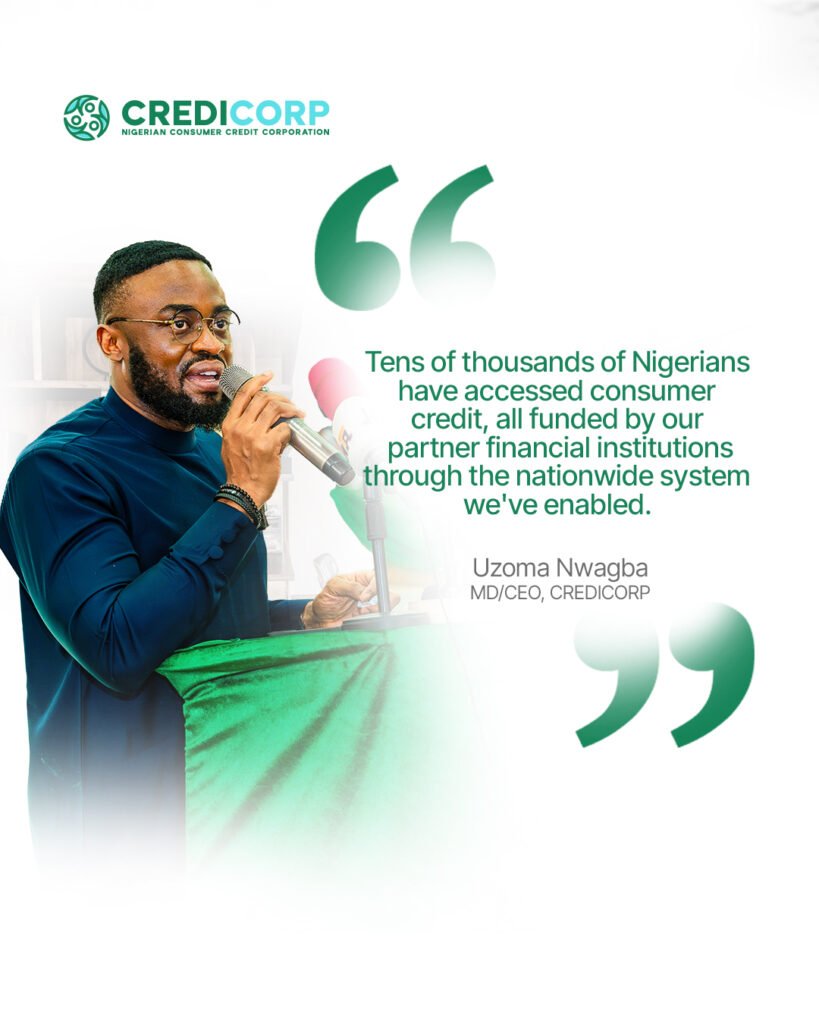The Federal Government of Nigeria is introducing a new reform that will connect every Nigerian’s credit score to their National Identification Number (NIN). This plan is to help build a fair and unified credit system that covers every citizen.
It is designed to make credit information more transparent and accessible, leaving no room for loan evasion or financial secrecy.
The Managing Director of the Nigerian Consumer Credit Corporation (CREDICORP), Uzoma Nwagba, announced the plan during a press briefing at the State House in Abuja.
He explained that the new credit system will collect and merge data from all financial institutions across the country, including banks, digital lenders, and microfinance organisations.
According to him, “Your NIN will now serve as the anchor for your credit profile. Whether you borrowed from a commercial bank, a microfinance institution, or a digital lender, that data will now be traceable and carry real consequences.”
This move is set to change how borrowing and lending are done in Nigeria. Citizens will be scored based on their borrowing history and how they repay loans. A default will no longer be without consequences.
Stricter Credit Rules to Curb Loan Default and Promote Financial Discipline
The CREDICORP boss made it clear that the time of escaping loan obligations is ending. He warned that defaulters may find it hard to renew official documents or access basic services.
“If you default on your loan, it could affect your ability to renew your passport, your driver’s license, or even rent a house. There will be no hiding place,” Nwagba said.

He also confirmed that all lenders will be required to report loan repayment records. The system will not punish people unfairly but will promote responsibility.
“Consequences for defaulters will be structured and deterrent, but not predatory. We are building a system that encourages responsible borrowing and rewards financial discipline,” he added.
The plan will use both financial and non-financial data to create accurate credit scores for all Nigerian adults. The goal is to ensure that every adult citizen has a score that reflects their financial behaviour.
“The ultimate goal is for everyone to have a credit score. This is not optional. We are creating a structure where your access to economic opportunities is directly tied to your financial behaviour,” Nwagba said.
Consumer Credit as a Tool for Welfare, Anti-Corruption, and Industrial Growth
Nwagba also explained that the reform supports President Bola Tinubu’s Renewed Hope Agenda. The plan is to improve living standards, reduce corruption, and strengthen local industries through access to credit.
“The first goal is to improve the quality of life. This is President Tinubu’s vision—to give Nigerians access to resources that can uplift their living conditions,” he said.
He explained that the credit system will reduce the stress on people’s regular income. Many civil servants and young professionals are pushed toward unethical choices because they lack access to capital.

He also said that access to consumer credit will support local industries. The idea is to help Nigerians buy locally-made goods through structured credit support, thereby growing the economy.
“We aim to tie consumer credit to the purchase of locally manufactured goods. That way, we support local producers, drive demand, and create jobs—ultimately building a sustainable economy,” he continued.
Nwagba urged financial institutions to support the national credit framework. He pointed to a ₦183 trillion credit gap and stressed that only full private sector involvement can solve it.
“No government in the world can provide that kind of money. Financial institutions must step up. With the right infrastructure and transparency, lenders will be more confident, interest rates will drop, and Nigerians will finally have access to affordable credit,” he said.
YouthCred Scheme to Empower Young Nigerians with Credit Access
CREDICORP is also working on a youth credit initiative called YouthCred. The program is designed to help young Nigerians, especially NYSC members, get structured financial support early in life.
“YouthCred is not an idea; it is a reality. It has started. The President has already announced it, and we’ve put all platforms, systems, and processes in place. We are tightening the launch sequence,” Nwagba explained.
YouthCred is part of a wider effort to expand credit access to people aged 18 to 35. CREDICORP is working with banks, tech firms, and youth groups to roll out the program.

The Executive Director of Operations at CREDICORP, Olanike Kolawole, said YouthCred is more than just a loan. It is about building trust and preparing young people for financial responsibility.
“YouthCred is more than a loan product—it’s a generational investment in trust, financial confidence, and economic inclusion. As we expand beyond NYSC to cover youths aged 18 to 35, we’re ensuring they develop healthy financial habits while accessing the tools to thrive in the economy,” Kolawole said.
With the new credit-NIN link, Nigeria is also changing how its people engage with official processes. Your financial record could soon affect your access to public services, and every citizen will have to play their part.
Rate, Like 👍, Comment, share this article and Follow us on our social media handles.








